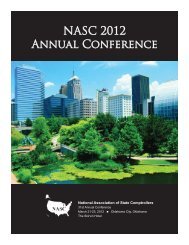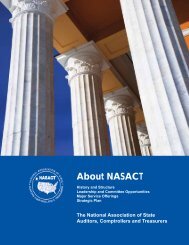Advisory Committee on Tax Exempt and Government Entities (ACT ...
Advisory Committee on Tax Exempt and Government Entities (ACT ...
Advisory Committee on Tax Exempt and Government Entities (ACT ...
You also want an ePaper? Increase the reach of your titles
YUMPU automatically turns print PDFs into web optimized ePapers that Google loves.
<strong>Government</strong>al Relati<strong>on</strong>ship <strong>and</strong> Communicati<strong>on</strong> Between the Internal Revenue Service <strong>and</strong> Indian Tribal <strong>Government</strong>s• “They aren’t helpful.”• “Unless there is something that is specifically pending that calls forc<strong>on</strong>sultati<strong>on</strong>, we’d prefer not to interact with them.”• “This Council would welcome more c<strong>on</strong>tacts that are positive[,] notc<strong>on</strong>fr<strong>on</strong>tati<strong>on</strong>al.”• “Sovereignty [is the reas<strong>on</strong> that we do not welcome more c<strong>on</strong>tacts].”I. ITG Employees’ Perspectives <strong>on</strong> IRS Relati<strong>on</strong>ships with TribesMost of the ITG specialists <strong>and</strong> managers who completed our survey of ITG pers<strong>on</strong>nel<strong>and</strong> resp<strong>on</strong>ded to our follow-up teleph<strong>on</strong>e calls gave extensive answers to ourquesti<strong>on</strong>s, providing a wealth of valuable feedback regarding the state of the IRS’srelati<strong>on</strong>ships with Tribes. In this secti<strong>on</strong> of the report, we provide a synthesis of theresp<strong>on</strong>ses to the survey <strong>and</strong> our follow-up questi<strong>on</strong>s as well as discuss specificresp<strong>on</strong>ses that illustrate broader themes, issues, <strong>and</strong> c<strong>on</strong>cerns.To the questi<strong>on</strong>s regarding who is c<strong>on</strong>tacted at the Tribe, we received a variety ofanswers. Several specialists stated that they always c<strong>on</strong>tact the elected Tribalchairpers<strong>on</strong> at the outset of any specific assignment, suggesting that they follow the IRSprotocols for c<strong>on</strong>tacting Tribes to the letter. Others follow the protocols at the outset oftheir relati<strong>on</strong>ship with the Tribe, initially c<strong>on</strong>tacting the Tribal chairpers<strong>on</strong> <strong>and</strong> thereafterc<strong>on</strong>tacting the pers<strong>on</strong> designated by the Tribal chairpers<strong>on</strong>. Some specialists gaveresp<strong>on</strong>ses that do not clearly indicate whether the specialist routinely follows theprotocols (e.g., the specialist stated that he or she determines who to c<strong>on</strong>tact based <strong>on</strong>“ITG’s database” or “the prior specialist’s history with the Tribe”), <strong>and</strong> others gaveresp<strong>on</strong>ses suggesting they may not be following the protocols (e.g., the resp<strong>on</strong>dentstated that he or she “normally” c<strong>on</strong>tacted the Tribal Treasurer or CEO first, or that he orshe “initially usually” c<strong>on</strong>tacted a “CFO, Accountant, Bookkeeper, or POA if there is<strong>on</strong>e”). Nineteen of the resp<strong>on</strong>dents stated that they had had c<strong>on</strong>tact with Tribal leadersduring the past year, but evidently not at every <strong>on</strong>e of their assigned Tribes, <strong>and</strong> threeresp<strong>on</strong>dents stated they had no c<strong>on</strong>tacts with Tribal leaders during the past year.The specialists generally reported that the number of c<strong>on</strong>tacts they have had with eachTribe over the past year varies based <strong>on</strong> a variety of factors. One specialist stated:“There can be several reas<strong>on</strong>s; the number of different entities at the tribe, turnover atthe Tribal offices or at the IRS, new requirements affecting the Tribe, a new IRS project,etc.” Another specialist pointed to the fact that some Tribes have “[o]n-goingcompliance checks, examinati<strong>on</strong>s, TRDAs [Tip Rate Determinati<strong>on</strong> Agreements]. Sometribes have multiple entities which increases the likelihood of c<strong>on</strong>tacts that the tribeinitiates. Usually the better the relati<strong>on</strong>ship between the Tribe <strong>and</strong> the IRSrepresentative, the more often the Tribe will initiate c<strong>on</strong>tact to seek assistance.”Some of the specialists appear to take more initiative than others with the Tribes towhich they are assigned, which can c<strong>on</strong>tribute to more frequent c<strong>on</strong>tacts than mightotherwise occur. One specialist, for example, “c<strong>on</strong>tacts most of my tribes 4 or 5 times aADVISORY COMMITTEE ON TAX EXEMPT AND GOVERNMENT ENTITIES (<strong>ACT</strong>) June 11, 2008 18













